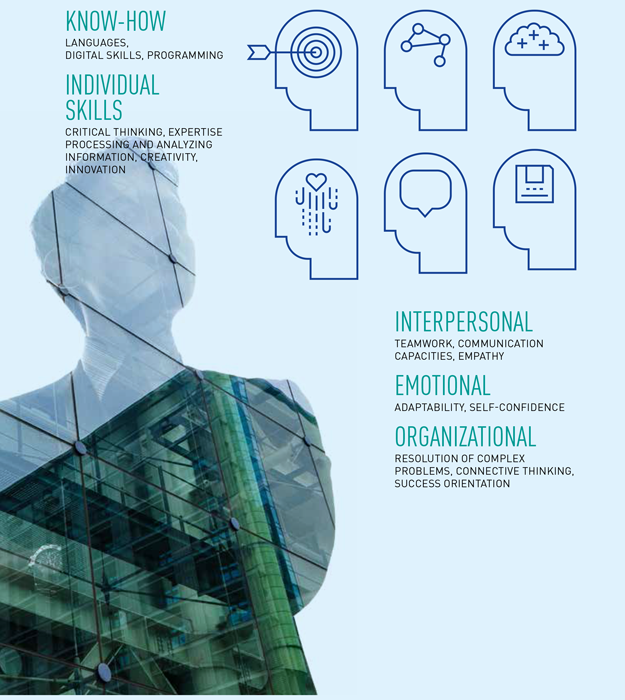The new technologies have had a tremendous impact on the workplace. New tasks are appearing that call for new skills. Are we ready for this?
TEXT RAMÓN OLIVER | IMAGES THINKSTOCK
The labor market is undergoing a true revolution. The emergence of new technologies has changed the needs of companies and the underlying trend is difficult to predict. How can we analyze the future when most of the jobs the new generations are going to perform do not even exist today? Within the voices that are analyzing the employment outlook for the coming years, is the recently published report “The Skills Revolution. Digitization and Why Skills and Talent Matter”. It was produced following an international survey by ManpowerGroup of 18,000 executives in 43 countries from six industrial sectors, asking how they felt technology was going to affect their business in the next two years, and how they were preparing to adapt their teams for the change. According to the study, three out of four business leaders believe that automation will call for new skill sets over the next two years, and more than 90 percent of the executives expect their organization to be affected by digitization within the same time frame. “We cannot slow the rate of technological advance or globalization, but we can invest in employees’ skills to increase the resilience of our teams and organizations”” was the view expressed in the report’s introduction by Jonas Prising, Chairman & CEO of the talent strategy multinational.
The unprecedented technological revolution we are witnessing has a vital role to play in the new scenario. It is no secret that the new digital environments are the ones calling the shots when it comes to employment generation at the global level. It is clear that, in the midst of this digital revolution, emerging technologies are laying down the terms for employment in the coming decades.
IN THE MIDST OF THIS DIGITAL REVOLUTION, EMERGING TECHNOLOGIES ARE LAYING DOWN THE
TERMS FOR EMPLOYMENT
The most in demand
In this changing environment, cybersecurity, big data, the Internet of Things, artificial intelligence and machine learning are the areas under the most pressure when it comes to finding qualified professionals. As a consequence, mathematicians, statisticians and programmers currently account for the vast majority of job offers. As Francisco Ruiz Antón, Public Policy Manager at Google points out, “The major companies are lining up to recruit software engineering graduates; they grab them all up and there are simply not enough.”
But the labor market is not limited to the IT sector, nor can all the professional profiles stem from these technical fields. What happens with the other profiles?
Amber Wigmore, Talent & Careers executive director at the IE Business School, is convinced that the humanities profiles have a great deal to say in these environments. “A growing labor trend is the creation of multidisciplinary teams, comprising professionals from different fields of knowledge, among others the humanities. In this way, companies are seeking a more global vision of the challenges they face. It could be said that the humanities are essential for understanding today’s world. The professionals who have studied these disciplines often bring valuable critical thinking to the table, which ends up paying its dividends to the company they work for,” she remarks.

According to the ManpowerGroup study, people who work in IT and customer service have good prospects, given that employers of these two groups forecast huge increases in recruitment. Rapid growth is also expected in the demand for data analysts, and in sales personnel specializing in digitized offerings. In the HR area, an increase in recruitment is expected throughout this adjustment period.
The academic record is no longer enough
The ways of working, motivations and our very conception of work are all changing. Formulas such as teleworking, flexible work schedules, work by objectives or projects, or a labor force in which freelance professionals are increasingly important are all gradually setting aside such concepts as permanent contracts or clocking in from nine to five. “Jobs for life no longer exist” Francisco Ruíz Antón affirms.
Technology giants such as Google have understood this reality only too well. Its worldwide Human Resources Manager, Laszlo Bock, already revealed this when, in a recent interview in the New York Times, he stated that “the academic record of the candidates is of no use at all.” From Google Spain, Francisco Ruíz Antón is not as categorical, although he does believe that hiring criteria have changed radically. “We’ve realized that certain cognitive skills such as empathy, leadership capacity, initiative, communication or creativity are often more important than having experience or specific training for the job position in question. Because, in no time at all, the people who fulfill these characteristics will be capable of performing the task for which they are to be hired.” The future is clearly for flexible, adaptable workers, who are sociable, connected to the world around them and able to creatively anticipate changes.
Training plays a significant role in this whole process. “The growing importance of technology and the digital world requires today’s worker to become increasingly aware of these environments and platforms,” Amber Wigmore suggests. She has no doubt that training remains the best investment to ensure future employment. But this training must be adapted to suit a socioeconomic reality in continuous transformation. “Workers must continue their training throughout their careers, view knowledge updating and acquisition as indispensable allies if they are to be able to fulfill their employment dreams,” the head of the talent area at the IE Business School summarizes the situatioN.
People versus robots
An analysis must be undertaken of the impact of the new robotic era on the world of work. The experts prefer to avoid scaremongering. The ManpowerGroup study, for example, shows that technology will replace routine manual and cognitive tasks, with the result that people may choose non-routine tasks and more rewarding jobs. “Creativity, emotional intelligence and cognitive flexibility” the report goes on, “are the skills that will exploit human potential and enable people to perform better than robots can, instead of being replaced by them.”
Nor does Ruiz Antón believe there are objective reasons to start tearing your hair out. “Any change creates uncertainty, but – as the Google executive points out – more than affecting jobs, robotization will enable tasks to be replaced and streamlined. “A machine may be able to diagnose a patient with greater precision and speed, but the creativity, care or kindness of a doctor or nurse can never be replaced.”





